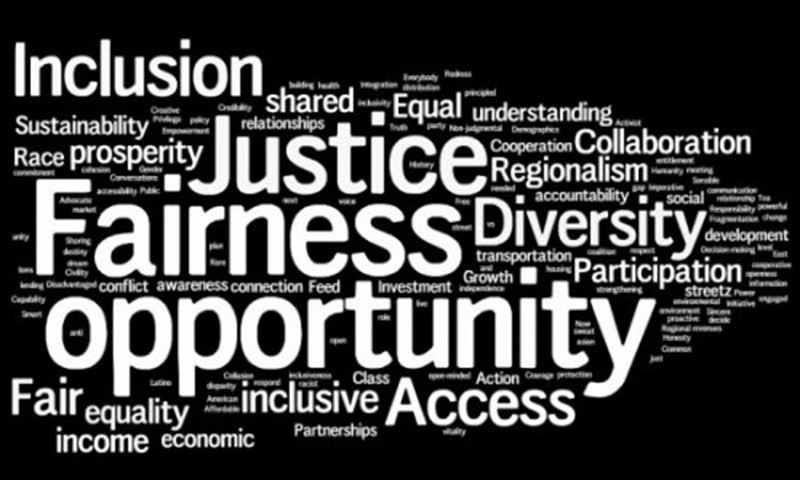If you have made the decision to undertake the enormous task of completing a doctoral program of study, you are most definitely driven by one or more strong underlying motivations. In our conversations with dissertation consulting clients, we hear stories of inspiration that range from broadening career advancement opportunities to meeting purely personal goals of achievement.
The drive to promote social justice in our communities and society is another very common motivator for those who embark upon dissertation journeys. Indeed, obtaining a graduate degree definitely expands your possibilities for ascending to professional positions that might afford you a higher degree of leverage to help others who experience disadvantage or marginalization. Accordingly, learning to conduct research that furthers social justice is a high priority for our clients who are working in fields that are aligned with social justice aims.
For those just getting their feet wet in this arena, we thought that an introduction to theories and methods that mesh well with social justice purposes might help you to begin thinking about ways to focus and structure your dissertation optimally. Before we get started, though, keep in mind that your dissertation is largely an exercise in learning how to conduct research. Those of us who are oriented toward social justice causes are often very ambitious in our aims; however, it is important to remember to keep a fairly narrow focus for your dissertation research.
We often joke with our clients that you can save the world after getting your doctoral degree, but when completing your dissertation, keeping a more constrained focus will help to avoid becoming overwhelmed and also help to get you through to the finish line in a reasonable timeframe. With that said, it is always a great idea to follow your passions when selecting your research topic and approach. We hope that this article will spark some ideas for how to shape that passion into an impactful dissertation study!
Conceptual or Theoretical Frameworks for Social Justice
Once you have chosen a general topic for your dissertation study, you will need to select a conceptual or theoretical framework that will help you to sharpen the focus of your inquiry. The conceptual or theoretical framework provides an explanatory structure for your study that is integral to the development of research questions—and interview questions in qualitative research—and also to the interpretation of your findings in the discussion chapter of your dissertation.
As social justice research is often aimed at elucidating perspectives or experiences of individuals who experience marginalization or discrimination, choosing a theory that speaks to experiential disparities will help to crystalize your particular approach to exploration of such experiences. Several theories have been developed in this vein, and we will go over a few in the following sections.
Feminist Standpoint Theory
Standpoint theory is a great place to start in our discussion of theories that work well as frameworks for social justice research. A core assumption of feminist standpoint theory is that knowledge is situated, meaning that individuals socially construct knowledge based upon their own particular “standpoints” in life and society (Harding, 1986). Central to the theory is the proposition that women’s perspectives are shaped by their social and political experiences and by their assignments to specific activities or roles in life.
As women—and other disempowered or marginalized groups—understand their realities more accurately than those in positions of comparative societal status or power, privileging their voices in your research is necessary if you aim to use your dissertation to help cultivate true understanding of their experiences of disempowerment (Crasnow, 2013). The nature and causes of disempowerment might be perceived very differently by members of dominant groups, who have never themselves experienced marginalization, compared with members of groups who have been historically marginalized.
Standpoint theorists therefore validate the “expert” status of marginalized persons when it comes to understanding and describing their own social realities. Rejecting the notion of a single, objective truth, standpoint theorists instead posit that a multiplicity of divergent social realities create a more thorough and accurate portrait of social reality than that which is endorsed by dominant cultural narratives (Harding, 1986). Research methods—especially qualitative research methods—that amplify participants’ experiences and their interpretations mesh well with standpoint theory, and we will go over a few of these a bit later in this article.
Critical Race Theory
Critical race theory is another important social justice framework used by many of our dissertation assistance clients, as it provides an unparalleled structure for inquiry and analysis of phenomena related to racial prejudice and discrimination. Foundational tenets of critical race theory asserted by legal scholars such as Derrick Bell (1995) are that race is a socially constructed concept and that racial discrimination against persons of color has historically served the interests of the dominant white population. Furthermore, critical race theorists state that racism is not an unusual or aberrant occurrence but is actually an ordinary, everyday experience of persons of color (Delgado & Stefancic, 2012).
Racial discrimination may be enacted through the more obvious or overt actions and speech commonly associated with notions of racism, but critical race theory also brings to light the frequent and subtle incidents of racial microaggression that nonwhite individuals routinely experience. Qualitative research and analysis can often be useful in illuminating these experiences.
For example, researchers have found that African Americans in positions of leadership were more likely to receive undesirable assignments compared with their white counterparts (Cook & Glass, 2013). African American leaders have also reported being subjected to repeated questions about their qualifications to lead in comparison with white leaders in their organizations (Hotchkins & Dancy, 2015), suggesting the presence of negative stereotypes regarding African Americans and leadership capability.
Through continually subjecting a person to derogatory social messages and stereotypes, microaggressions can have adverse cumulative psychological effects on the targeted person, including a diminished sense of social identity. However, due to their subtlety, microaggressions may often be completely unobserved or simply discounted by individuals who themselves have not been subject to such subtle, persistent insult. Therefore, giving voice to “counterstories” through qualitative research is often useful in illuminating the social experiences of persons of color (Delgado & Stefancic, 2012).
Another important concept associated with critical race theory is intersectionality, which refers to the overlapping categories (e.g., race and gender) that create one’s social identity and that might result in the experience of particular forms of discrimination. As an example, researchers have found evidence that African American female students may be stereotyped in particular ways (e.g., viewed as “loud” or hypersexual) that indicated an intersectionality effect (Blake, Butler, Lewis, & Darensbourg, 2011; Wun, 2015). If you are focusing your dissertation research on a population that is multiply marginalized, understanding the notion of intersectionality can help to refine your sensitivity to the nuances your participants might express when sharing their experiences.
Fundamental Cause Theory
Finally, for those of our dissertation consulting clients who are interested in investigating socioeconomic inequality and health disparities, we have found fundamental cause theory to be an invaluable framework. Although it is commonly understood that poverty is associated with a wide variety of adverse outcomes, the guiding proposition of fundamental cause theory is that socioeconomic status (SES) itself is the primary underlying predictor of disease (Link & Phelan, 2010).
This is because one’s SES is closely associated with the types of risk factors a person experiences, and this is also because SES affects access to a variety of resources that might help to mitigate such risk factors for disease. If you are interested in examining social justice issues associated with SES, understanding the cascading effects of poverty is essential. If your focus is specifically on disparate health outcomes experienced by persons with lower SES, then the fundamental cause theory will definitely come in handy.
Methods That Align with Social Justice Research Purposes
Just as certain theories lend themselves well to the study of social justice topics, certain research approaches align quite nicely with examinations of such topics. Most of our dissertation assistance clients who are working toward social justice ends via their studies lean toward methods that allow for exploration of their participants’ complex experiences and viewpoints; so, we will mainly focus on the qualitative research approaches that permit such first-hand exploration.
However, do note that quantitative methods can also be used in studies that further social justice aims. For example, a researcher wishing to document the current state of income inequality by race or gender in the U.S. would definitely want to lean primarily on statistical analysis of numerical data. On the other hand, if a researcher wished to cultivate understanding of the perspectives of members of groups who experience income inequality, then using a qualitative analysis approach would be most fitting. We often assist our dissertation consulting clients to weigh their methodological options, and here are a few of the most popular choices in this regard.
Phenomenology
One of the most commonly used qualitative research designs among our clients who are conducting dissertation research to serve social justice purposes is phenomenology. The central focus of phenomenology is the exploration of individuals’ lived experiences (Moustakas, 1994). Through this type of exploratory qualitative research approach, a researcher works to derive understanding of how participants interpret and understand their own experiences. A key aim of phenomenology is to help others understand the “essences” of participants’ lived experiences–in other words, how they make sense of these experiences (Moustakas, 1994).
Recall that integral to some of the theories we reviewed earlier was the proposition that, to fully understand the social realities of marginalized persons, we must hear and privilege the viewpoints and perspectives of these individuals. This core assumption of theories such as critical race theory and feminist standpoint theory mesh very nicely with the processes involved in phenomenological inquiry. This is because when conducting qualitative analysis within a phenomenological study, researchers deliberately work to privilege the perspectives and interpretations of participants through bracketing; this refers to the conscious recognition and setting aside of their own viewpoints and biases in the qualitative analysis process (Tufford & Newman, 2012).
The bracketing process is aimed at avoiding the imposition of researcher bias on the findings, which serves to amplify the accounts as shared by participants on their own experiences. This privileging of participants’ viewpoints demonstrates respect for each as the expert on his or her own life, and it can make phenomenology empowering as it provides access to the viewpoints of those who may be otherwise marginalized or unheard.
Narrative Analysis
Another variant of qualitative research and analysis that works well in social justice research is narrative analysis. The overall aims of narrative qualitative analysis and phenomenology are similar that they both involve in-depth explorations of participants’ experiences and perspectives. However, an important difference is that narrative analysis is particularly suited to studies where it is essential to understand the “big picture” of the participants’ life stories to truly answer the purpose and research questions.
Although phenomenology provides understanding of participants’ perceptions and interpretations of their lived experiences, narrative analysis moves a step further by using qualitative analysis to amplify the storied structure of participants’ experiences over a specific course of time or events (Wang & Geale, 2015). The particular focus of narrative analysis is to highlight not only the content of participants’ stories, but also the interpretation of the form and the meanings of that content: how the stories are constructed, what the functions are of telling those stories to the individual, and how the story is told by the participant.
This expanded lens permits researchers to better understand how participants represent themselves and their experiences. Narrative analysis thereby allows participants’ perspectives to be forefront, providing a prime research structure for the dissemination of counterstories that call into question dominant cultural narratives.
Ethnography
Ethnography is another design within the qualitative research paradigm that aligns well with social justice research purposes. A researcher can use ethnographic research to cultivate an in-depth understanding of complex social and/or cultural phenomena within particular groups or settings (Van Maanen, 2011). Key to this approach is the researcher’s direct immersion in and interaction with the setting or group of interest. Unlike research designs such as phenomenology that require bracketing of one’s own viewpoints, in ethnography, the researcher’s own experiences, perspectives, and interpretations are integral to inquiry and analysis.
Because this form of qualitative research is aimed developing a nuanced understanding of social and cultural complexities as they occur within the group of interest, data collection must take place over an extended period of time. An ethnographic researcher often uses a combination of immersive approaches, including participant and nonparticipant observation, interviews, and review of archival documents, artifacts, or symbols that have relevance or meaning within the group of interest. This form of qualitative research and analysis can be especially powerful due to the researcher’s intimate connections with the issue of interest in the study.
Action Research
Action research is another great fit for social justice research that becomes possible when you, as the researcher, have the opportunity to use your own area of practice as the focus of your study. Action researchers are interested in understanding how they can make improvements in their arenas of practice, and the action research study is a means of evaluating such questions in a rigorous manner (McNiff, 2013).
Many of our dissertation assistance clients who are studying education or nursing practice are required to conduct an action research project for their capstones or dissertations, but the approach can be fitting in a variety of settings. To meet the criteria for an action research study, your project needs to involve a specific action that is taken in order to improve certain outcomes for stakeholders. Then, you need to conduct a formal evaluation of this action, which might include collection of data for both quantitative and qualitative analysis. In fact, mixed methods studies are often well-suited to action research purposes.
For example, educators might wish to understand how to improve STEM subject engagement among female students, or nurses might wish to understand how to better integrate culturally sensitive practices into their clinical settings. An “action” phase of the study (e.g., an intervention or training program) would be paired with the “research” phase of the study (i.e., qualitative and/or quantitative data collection to evaluate the action), resulting in enhanced understanding of how to enact desired improvements. This research approach can help to advance knowledge on practice that promotes social justice while also providing the rewards of simultaneous action toward those ends.
Ethical Considerations of Particular Importance in Social Justice Research
Ethical considerations for any study that includes human participants must demonstrate attention to specific risks of participation and how these might be mitigated. If you are interested in conducting your dissertation research for social justice purposes, however, there are some particular areas of risk to consider as you design your research protocol.
One aspect of qualitative research to consider is the psychological risk associated with discussing experiences and stories related to the experience of marginalization. Qualitative analysis of interviews with individuals who have experienced discrimination in its various forms can provide powerful findings that illuminate the nature and meanings of these experiences to an audience who might not otherwise relate to such experiences.
Although participants often experience a sense of empowerment emerging from participation in social justice research, the process of reliving their previous experiences of marginalization and disenfranchisement can be psychologically painful as well. As part of your ethical preparations (i.e., IRB) for your dissertation, you will need to plan for such risks. For example, you might be prepared to offer counseling resources to help participants through difficult emotional reactions. Or, you might be ready to skip interview questions or offer to conclude an interview altogether if a participant becomes distressed.
Another area of risk emerges from the sharing of perspectives that might be controversial in certain contexts. For example, participants who share experiences of discrimination in the workplace might be at risk of retaliation if they are identifiable, and if their superiors at work object to what they have shared in their interviews. Safeguarding your participants’ anonymity and confidentiality is an essential protection for addressing this type of risk.
Final Thoughts
Although this has been a very brief introduction to theories and research methods commonly used in social justice research, we hope that it has given you a sense of what might be possible as you plan your dissertation research. We often help our dissertation consulting clients out with the earliest steps of imagining possible dissertation pathways, and we are always happy to partner in research that ultimately serves the common good. Contributing your strengths toward the benefit of others via your dissertation is sure to be an exciting and inspiring endeavor, and we wish you success!
References
- Bell, D. A. (1995). Who’s afraid of critical race theory. Illogical Politics, 893. Retrieved from http://lawdawghall.blogspot.ca/2012/03/ derrick-bell-whos-afraid-of-critical.html
- Blake, J. J., Butler, B. R., Lewis, C. W., & Darensbourg, A. (2011). Unmasking the inequitable discipline experiences of urban Black girls: Implications for urban educational stakeholders. Urban Review, 43(1), 90-106. doi:10.1007/s11256-009-0148-8
- Cook, A., & Glass, C. (2013). Glass cliffs and organizational saviors: Barriers to minority leadership in work organizations? Social Problems, 60(2), 168-187. doi:10.1525/sp.2013.60.2.168
- Crasnow, S. (2013). Feminist philosophy of science: Values and objectivity. Philosophy Compass, 8(4), 413-423. doi:10.1111/phc3.12023
- Delgado, R., & Stefancic, J. (2012). Critical race theory: An introduction. New York, NY: NYU Press.
- Harding, S. (1986). The science question in feminism. Ithaca, NY: Cornell University Press.
- Hotchkins, B. K., & Dancy, T. E. (2015). Black male student leaders in predominantly white universities: Stories of power, preservation, and persistence. Western Journal of Black Studies, 39(1), 30-44.
- Link, B. G., & Phelan, J. (2010). Social conditions as fundamental causes of health inequalities. In C. E. Bird, P. Conrad, A. M. Fremont, & S. Timmermans (Eds.), Handbook of Medical Sociology (pp. 3-17). Nashville, TN: Vanderbilt University Press.
- McNiff, J. (2013). Action research: Principles and practice. London: Routledge.
- Moustakas, C. (1994). Phenomenological research methods. Thousand Oaks, CA: Sage.
- Tufford, L., & Newman, P. (2012). Bracketing in qualitative research. Qualitative Social Work, 11(1), 80-96. doi:10.1177/1473325010368316
- Van Maanen, J. (2011). Tales of the field: On writing ethnography. Chicago, IL: University of Chicago Press.
- Wang, C. C., & Geale, S. K. (2015). The power of story: Narrative inquiry as a methodology in nursing research. International Journal of Nursing Sciences, 2(2), 195-198. doi:10.1016/j.ijnss.2015.04.014
- Wun, C. (2015). Against captivity: Black girls and school discipline policies in the afterlife of slavery. Educational Policy, 30, 171-196. doi:10.1177/0895904815615439








